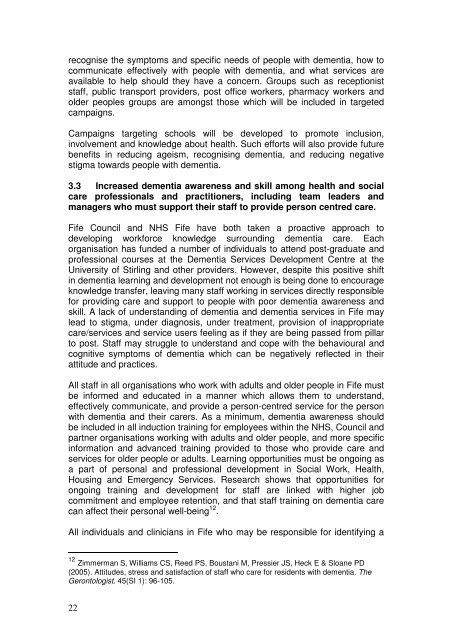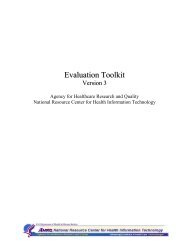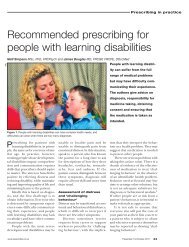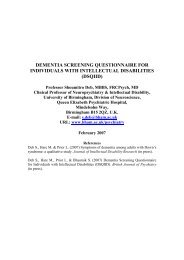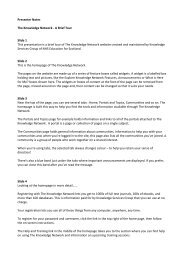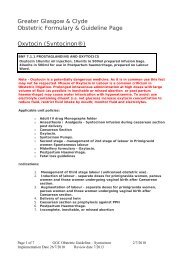The Fife Dementia Strategy: 2010 â 2020 - The Knowledge Network
The Fife Dementia Strategy: 2010 â 2020 - The Knowledge Network
The Fife Dementia Strategy: 2010 â 2020 - The Knowledge Network
You also want an ePaper? Increase the reach of your titles
YUMPU automatically turns print PDFs into web optimized ePapers that Google loves.
ecognise the symptoms and specific needs of people with dementia, how to<br />
communicate effectively with people with dementia, and what services are<br />
available to help should they have a concern. Groups such as receptionist<br />
staff, public transport providers, post office workers, pharmacy workers and<br />
older peoples groups are amongst those which will be included in targeted<br />
campaigns.<br />
Campaigns targeting schools will be developed to promote inclusion,<br />
involvement and knowledge about health. Such efforts will also provide future<br />
benefits in reducing ageism, recognising dementia, and reducing negative<br />
stigma towards people with dementia.<br />
3.3 Increased dementia awareness and skill among health and social<br />
care professionals and practitioners, including team leaders and<br />
managers who must support their staff to provide person centred care.<br />
<strong>Fife</strong> Council and NHS <strong>Fife</strong> have both taken a proactive approach to<br />
developing workforce knowledge surrounding dementia care. Each<br />
organisation has funded a number of individuals to attend post-graduate and<br />
professional courses at the <strong>Dementia</strong> Services Development Centre at the<br />
University of Stirling and other providers. However, despite this positive shift<br />
in dementia learning and development not enough is being done to encourage<br />
knowledge transfer, leaving many staff working in services directly responsible<br />
for providing care and support to people with poor dementia awareness and<br />
skill. A lack of understanding of dementia and dementia services in <strong>Fife</strong> may<br />
lead to stigma, under diagnosis, under treatment, provision of inappropriate<br />
care/services and service users feeling as if they are being passed from pillar<br />
to post. Staff may struggle to understand and cope with the behavioural and<br />
cognitive symptoms of dementia which can be negatively reflected in their<br />
attitude and practices.<br />
All staff in all organisations who work with adults and older people in <strong>Fife</strong> must<br />
be informed and educated in a manner which allows them to understand,<br />
effectively communicate, and provide a person-centred service for the person<br />
with dementia and their carers. As a minimum, dementia awareness should<br />
be included in all induction training for employees within the NHS, Council and<br />
partner organisations working with adults and older people, and more specific<br />
information and advanced training provided to those who provide care and<br />
services for older people or adults. Learning opportunities must be ongoing as<br />
a part of personal and professional development in Social Work, Health,<br />
Housing and Emergency Services. Research shows that opportunities for<br />
ongoing training and development for staff are linked with higher job<br />
commitment and employee retention, and that staff training on dementia care<br />
can affect their personal well-being 12 .<br />
All individuals and clinicians in <strong>Fife</strong> who may be responsible for identifying a<br />
12 Zimmerman S, Williams CS, Reed PS, Boustani M, Pressier JS, Heck E & Sloane PD<br />
(2005). Attitudes, stress and satisfaction of staff who care for residents with dementia. <strong>The</strong><br />
Gerontologist. 45(SI 1): 96-105.<br />
22


